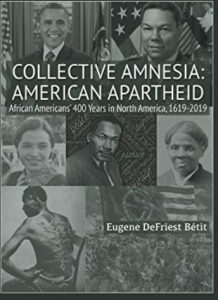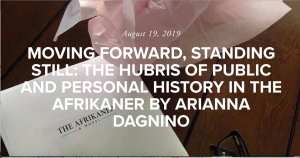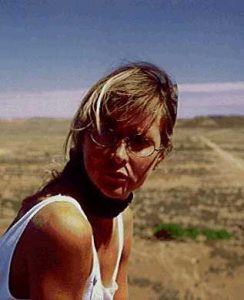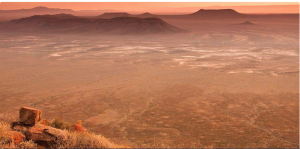 “When it comes to societies like South Africa, there is always something that will contradict your preconceived notions,” says Arianna Dagnino, author of “The Afrikaner,” published by Guernica Editions (Toronto) in 2019.
“When it comes to societies like South Africa, there is always something that will contradict your preconceived notions,” says Arianna Dagnino, author of “The Afrikaner,” published by Guernica Editions (Toronto) in 2019.
“I think what is happening now in the Western world is something that has already happened in South Africa,” says Dagnino, who spent five years in the then newly democratic South Africa and can write about that time with great ease.
This is how journalist Victor Van Der Merwe starts our interview on my South African-based novel “The Afrikaner.” The interview was published in the October issue of BC magazine “The Source” (Volume 20, Issue 06 – October 8–22, 2019).
You can read the rest of the interview here below or at this link:
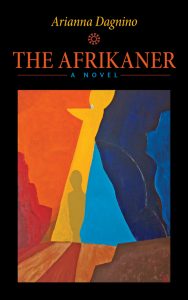 The novel is set in the South Africa of 1996. The book follows Zoe du Plessis, a paleontologist of Afrikaner descent, struggling with white group guilt, a dark family secret and the recent loss of a lover and colleague. The Afrikaner begins as Zoe embarks on a journey of self-discovery and atonement, while on a field expedition into the hot plains of the Kalahari Desert. She is there in search of early human fossils.
The novel is set in the South Africa of 1996. The book follows Zoe du Plessis, a paleontologist of Afrikaner descent, struggling with white group guilt, a dark family secret and the recent loss of a lover and colleague. The Afrikaner begins as Zoe embarks on a journey of self-discovery and atonement, while on a field expedition into the hot plains of the Kalahari Desert. She is there in search of early human fossils.
Witness to transition
Dagnino was born in Italy but has traveled as far as London, Boston and Moscow for work and studies. In 1996, Dagnino and her husband moved to South Africa to become international correspondents who wrote for the Italian press. Aside from the wire service, she and her husband were the only two Italian reporters in the country.
“It was the right time to be there (South Africa),” says Dagnino. “All the foreign correspondents from the UK, the US, from all over Europe, they were all interested in what was happening there. It was a very dramatic moment of transition for the country, so everyone wanted to witness what was happening and report about it.”
As a former travel writer for an Italian magazine, she was mostly prepared for what to expect when arriving in Africa, but there were still facets of South African life that surprised her.
“What really surprised me was that most of the white people in South Africa had never visited a township,” says Dagnino. “So, the first thing I did as a reporter, I went into the Soweto township to see how people lived there.”
Dagnino says she ended up being the person that told white South Africans about how people live in Soweto, one of South Africa’s most famous townships. The class distinction even within a township like Soweto was another big surprise.
“It was a real city. It wasn’t a squatter camp like the Favelas in Brazil. There were people there who were very poor, but there were also people who were very rich. Some people had mansions and big cars in Soweto,” she says.
Moving to Canada
In 2000, Dagnino and her husband left South Africa and moved to Australia where she received her PhD in Comparative Literature and Sociology. After a few years of living in Australia, Dagnino and her family again faced the choice of a new destination. The couple applied for Canadian permanent residency at the same time they applied for Australian permanent residency. After Dagnino received her PhD, they figured, why not give Canada a try?
“We wanted to offer our kids the opportunity to experience being raised in an English-speaking country,” she says. “We felt it was important for them to be raised in a place that would give them a lot more opportunities.”
It was in Canada, where Dagnino started and finished the novel The Afrikaner. Although the story takes place in a very remote corner of the world and is set in a very specific time of South Africa’s history, Dagnino still feels everyone can take something from the theme of the book.
“I think the theme is very universal,” she says. “I think it is important for people to understand that they need to address certain issues related to racial divisions.”
Dagnino hopes everyone who reads her book takes away the idea that we should not be so quick to judge.
“Societies are very complex and South Africa’s society is one of the most complex I have experienced,” she says. “It is very challenging. It isn’t black and white, there are many shades of grey and we need to take into consideration these shades of grey before creating our perception, before making judgements.”
Dagnino currently teaches at UBC.
Full interview here: http://thelasource.com/en/2019/10/07/universal-themes-in-a-unique-setting/
For more information on Arianna Dagnino and her novel “The Afrikaner” go to:
Hate, Love, Guilt and Redemption under African Skies
http://fhis.ubc.ca/people/arianna-dagnino/
https://blogs.ubc.ca/ariannadagnino/
 while living in Canada (Guernica Editions, Toronto, 2019), I am particularly eager to receive feedback from South African and Canadian readers. Thus, I am grateful to fiction editor Tracy Buenk from Durban, South Africa and independent writer Vernice Shostal from British Columbia for their thoughtful feedback.
while living in Canada (Guernica Editions, Toronto, 2019), I am particularly eager to receive feedback from South African and Canadian readers. Thus, I am grateful to fiction editor Tracy Buenk from Durban, South Africa and independent writer Vernice Shostal from British Columbia for their thoughtful feedback. “I found The Afrikaner an amazing work of fiction and perhaps some non-fiction, which took a look at contemporary issues in the new South Africa. The personal life of the character, Zoey, and the people she is associated with, leave the reader with a feeling of hope toward a humanitarian consciousness and resolving past issues, including her own past superstitions; however, perhaps, like First Nation people in Canada, who were also betrayed by colonialism, the novel showed that not all black South Africans are able to quickly forgive the past. The imagery in the novel presents the country of South Africa as a living, breathing soul, albeit a parched and harried one” (Vernice Shostal, independent writer)
“I found The Afrikaner an amazing work of fiction and perhaps some non-fiction, which took a look at contemporary issues in the new South Africa. The personal life of the character, Zoey, and the people she is associated with, leave the reader with a feeling of hope toward a humanitarian consciousness and resolving past issues, including her own past superstitions; however, perhaps, like First Nation people in Canada, who were also betrayed by colonialism, the novel showed that not all black South Africans are able to quickly forgive the past. The imagery in the novel presents the country of South Africa as a living, breathing soul, albeit a parched and harried one” (Vernice Shostal, independent writer)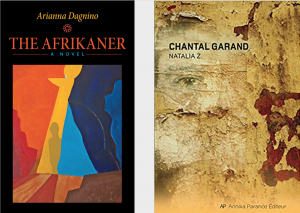
 “When it comes to societies like South Africa, there is always something that will contradict your preconceived notions,” says Arianna Dagnino, author of “The Afrikaner,” published by Guernica Editions (Toronto) in 2019.
“When it comes to societies like South Africa, there is always something that will contradict your preconceived notions,” says Arianna Dagnino, author of “The Afrikaner,” published by Guernica Editions (Toronto) in 2019.



